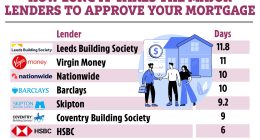
WASHINGTON—Global inequality is likely to widen this year as a small number of major economies power the fastest recovery in 80 years while many poorer countries struggle to return to pre-pandemic income levels, the World Bank said.
The global economy is set to grow by 5.6% this year, up from a January forecast of 4.1%, marking the fastest recovery from five post-World War II recessions, the bank said Tuesday in its semiannual Global Economic Prospects report.
“While there are welcome signs of global recovery, the pandemic continues to inflict poverty and inequality on people in developing countries around the world,” David Malpass, president of the World Bank Group, said. The bank provides loans and technical advice to developing and emerging economies.
SHARE YOUR THOUGHTS
How should inflation in developing nations be addressed? Join the conversation below.
While about 90% of advanced economies are expected to regain their pre-pandemic per capita income levels by 2022, only about one-third of emerging-market and developing nations are likely to do so, the bank said, in part because of uneven access to Covid-19 vaccines.
The Covid-ravaged global economy shrank an estimated 3.5% in 2020, the bank said. While the rebound is forecast to continue next year with growth of 4.3%, the level of output will remain 2% below pre-pandemic projections.
Growth in the U.S., the world’s largest economy, is projected at 6.8% this year, up from the bank’s January forecast of 3.5%. Growth is forecast at 8.5% in China, the second-largest economy, 8.3% in India and 4.2% in the euro area.
By contrast, the bank cut its growth forecast for low-income countries—those with an annual gross national income per capita of $1,035 or less—to 2.9% this year from an earlier projection of 3.4%. Many of those countries are in sub-Saharan Africa.
High debt levels pose a threat to the outlook for many emerging and developing countries as inflation could lead to higher borrowing costs, the bank said. A resurgence of Covid-19 also poses a threat.
“Unless risks from record-high debt are addressed, these economies remain vulnerable to financial-market stress should investor risk sentiment deteriorate as a result of inflation pressures in advanced economics,” said Ayhan Kose, director for the World Banks’ Prospects Group.
Global inflation is expected to remain under control for advanced economies and half of emerging-market and developing countries. However, low-income countries that do experience higher inflation could be hit particularly hard by increases in food prices.
Global price levels declined by 0.9 percentage point between January and April last year, amid a collapse in demand and lower oil prices. But inflation quickly returned and exceeded pre-pandemic levels by April 2021, the World Bank said. The bank forecasts the global inflation rate to increase to 3.9% this year from 2.5% during 2020.
The International Monetary Fund, a lender to countries in financial distress, said in April the world economy would grow by 6% this year, up from its January forecast for 5.5% growth.
Write to Yuka Hayashi at [email protected]
Copyright ©2020 Dow Jones & Company, Inc. All Rights Reserved. 87990cbe856818d5eddac44c7b1cdeb8









